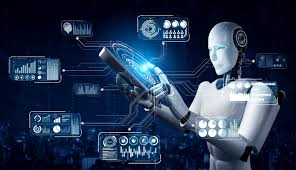What is machine learning?
Machine learning is a branch of computer science that allows computers to learn from data without being explicitly programmed. It can be used to identify patterns in large amounts of data, making it an important tool for tasks such as marketing, search engine optimization, and medical diagnosis.
There are many types of machine learning, but the most common is supervised learning.
- In supervised learning, the computer is given a set of training data (usually consisting of examples of what you want the machine to learn), and it is asked to predict an outcome (usually a class or label) for a new piece of data. The computer is then improved by being given more training data and told to predict the outcome for this new data.
- Unsupervised learning is similar to supervised learning, except there is no predefined output category (or class). Unsupervised learning is used when you want to find patterns in your data that don't correspond with any predetermined categories. For example, you might want to see which words are used most often in text documents, or how frequently different words are associated with one another.
- Reinforcement learning is a type of machine learning that uses feedback loops to learn from experience. In reinforcement learning, the computer aims to maximize some desirable behaviour (like getting food pellets as rewards), and it learns how best to achieve this by trial and error.
How do machine learning algorithms work?
Machine learning algorithms are used to automate the task of data analysis. They work by "learning" from data sets and using that information to make predictions or recommendations. There are a variety of different machine learning algorithms available, but the most common ones are supervised learning and unsupervised learning.
Supervised learning is used when you want the algorithm to learn from a set of labeled data sets (where each data set corresponds to one specific category). The algorithm is given a set of training data sets (containing examples of the desired category) and it must learn how to identify instances of that category in new data sets. For example, if you wanted the algorithm to recognize images of dogs in new photos, you would give it a set of labeled dog images as training data and it would learn how to do this with relative ease.
Unsupervised learning is used when you don't have any labeled training data sets available. The algorithm must "learn" how to identify instances of a category by analyzing all the available data sets (without being told which ones belong to which category). This can be more difficult than supervised learning, because there is no exact way to tell which instances constitute a particular category. For example, if you wanted the algorithm to recognize images of dogs in all the photos on your computer, unsupervised learning would be your best option.Machine learning algorithms can be applied for a variety of purposes, including marketing research, product classification, fraud detection, and social media analysis.
Who does machine learning consulting?
Machine learning consulting is a growing industry that provides solutions for businesses to improve their data and machine learning capabilities. There are many different types of consultants, but most fall into one of three categories: data scientists, machine learning engineers, or artificial intelligence experts.
Data scientists are responsible for transforming raw data into insights that can be used by the business. They use a variety of statistical and mathematical methods to analyze data sets and create models that can make predictions. Machine learning engineers work with algorithms and models to develop solutions for businesses. They may specialize in a certain type of machine learning algorithm or have experience using multiple algorithms. Artificial intelligence experts help businesses design or train neural networks or other AI applications.
To become a machine learning consultant, you will need to have a degree in statistics, mathematics, computer science, or related field. You will also need experience working with data sets and modeling techniques. Some skills that are helpful include programming languages such as Python or R, Microsoft Excel, SQL Server, and Git. Additionally, you should have experience working with big data platforms such as Hadoop or Spark. You will need to be comfortable talking to business leaders about the value of your work and provide detailed proposals outlining your proposed solutions.
Why would I need machine learning consulting?
Machine learning consulting can provide businesses with the ability to identify patterns in data and make predictions about future events. This is a powerful tool that can be used for a variety of purposes, such as improving customer service or predicting financial outcomes. Consulting services can help businesses identify which machine learning algorithms are the most effective and recommend modifications to those algorithms if necessary.
Conclusion;
In this article, we will discuss what machine learning is, how it works, and the types of consulting services offered. We will also provide a few tips on how to find the right machine learning consultant for your project and some considerations you should make when engaging one. Finally, we will give you an example of a project that involved machine learning consultation and show you how our approach can help speed up the process. So if you are looking to get into or stay in the machine learning industry, this is an essential read!


No comments yet